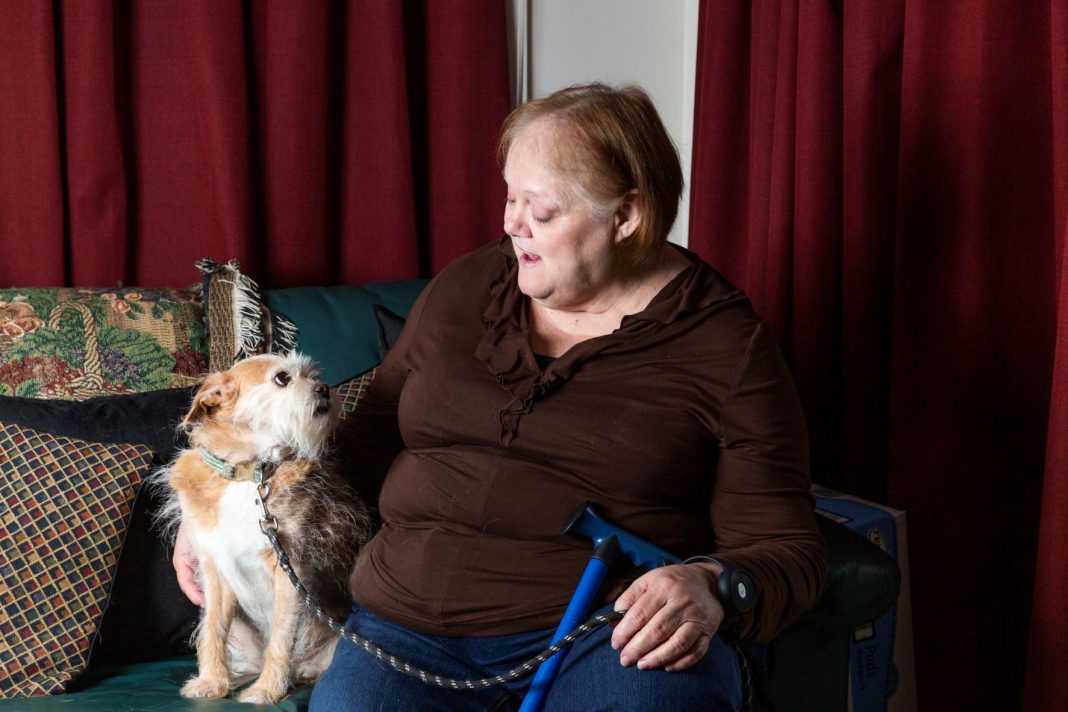“Sometimes I think to myself ‘why am I so bloody cheerful?’,” says Delwyn Boundy, 64, who has been “profoundly disabled” since a surgery at 36 left her learning how to walk again.
Noticing a significant tremor at the beginning of the pandemic, Del flagged the symptom with her doctors and was told it was anxiety, or there was no real reason for it, or it was because of her spinal issues.
Progressively becoming worse, Del was eventually diagnosed with Parkinson’s disease.
“Some of my friends say it [Parkinson’s] is not just tedious, it’s also insidious, because if you’re lying in bed and in the right position, you think you’re great, but as soon as you step up you feel like you’re 110,” Del says.
“The shuffling and the postural stuff and just getting around in general can be really painful, especially in late-stage Parkinson’s. A lot of people get discouraged because they’re in pain and they’re not responding to the medication.
“When the pain isn’t relieved, some people give up.”
Del is still in the early stages of Parkinson’s, and says her doctor considers her to be doing “pretty well” thanks to her exercise regime, strength training, and activities with Parkinson’s ACT.
“I actually found a notice in the Canberra Daily for a Parkinson’s choir and the lady who runs it, Chrissie Shaw, used to share a house with me years ago. I went along to see if it would work for me and they’re such an optimistic group,” Del smiles.
“They get there on Monday mornings and it’s so nice to see people who get absorbed into the singing. Although, I am sick of singing Me and My Shadow…”
With a cheeky nature and rarely seen without a grin, Del mostly remains optimistic, but admits there are dark pockets of her illnesses she falls victim to at times.
“Incontinence is just crap – it really is. To be 36 and have three kids, one in primary school and the others a bit older, it was just horrific. I had to learn how to walk and balance again, which is still a real issue,” Del says.
“I frequently fall, but balance and strength training when you have Parkinson’s is the key to get that under control.
“Doctors will generally write ‘this woman is highly motivated and is very cheerful’, and I just think you should see me at 4am and I’m not freaking cheerful then! But, I think that the encouragement from the Parkinson’s ACT organisation helps.
“They have a painting with Parkinson’s group and I’m starting to think that it looks like the go. I’m putting it on my list of things I’d like to do.”
Del sympathises with her fellow Parkinson’s sufferers, and says the disease can be isolating, but finding strength in numbers is key to keeping depression at bay.
“The men and women I’ve met with Parkinson’s ACT are a resilient mob. It’s better if you have a good family base or if you can get good information for you and your family, because caring for someone with Parkinson’s isn’t always the greatest thing to deal with,” she says.
“You don’t get a break with Parkinson’s … it’s full on, but I’ve improved so much with on my medications. My goal in my NDIS plan is to travel. It hasn’t happened yet, but Bhutan is sounding really nice.”
Parkinson’s study gives hope for medical breakthrough
While research into Parkinson’s has progressed in leaps and bounds since its discovery, there is still very little known about what causes the disease.
More than 100,000 Australians live with Parkinson’s and it’s the second most common neurological condition, but it remains the least understood.
Aiming to crack its genetic code, researchers are undertaking a ground-breaking study to assist the identity of genetic factors influencing the risk of developing Parkinson’s.
Named the Australian Parkinson’s Genetics Study (APGS), it is set to contribute towards the largest study of Parkinson’s ever embarked upon – the Global Parkinson’s Genetic Program.
Del has put her hand up to be a part of the study, as both her father and her grandfather lived with Parkinson’s, and she wants to know if her children are likely to be predisposed to the disease.
“My dad has already passed, and I thought I’d actually like to know more about Parkinson’s and whether my children are susceptible,” says Del.
“We all go sometime, but preparation is the key to help tackle any illness.”
CEO of Shake It Up Australia Foundation, Clyde Campbell, lives with Parkinson’s himself and says there’s so much to discover about the disease.
“This study opens us up to so many possibilities. We are truly on the edge of a potential medical breakthrough in our lifetime, which could change the face of the disease,” he says.
“To make that possible though, we need those living with Parkinson’s to sign up so we can understand its complexities.”
Participation in the study is strictly confidential and all participant information provided will be maintained in accordance with Australian regulations.
To sign up to the Australian Parkinson’s Genetic Study, or to find out more information, visit www.qimrberghofer.edu.au/apgs/
Parkinson’s ACT marks World Parkinson’s Awareness Month
Calling all Canberrans with Parkinson’s! To mark the end of World Parkinson’s Awareness Month (April), the ACT Parkinson’s community are hosting a Picnic in the Park on Sunday 1 May from 11am to 1.30pm at the lawns of the Canberra Yacht Club in Yarralumla.
The community is invited to enjoy an event filled with dancing, music, art, games, raffles, and plenty of children’s activities – there’s fun for the whole family.
Canberra Daily would love to hear from you about a story idea in the Canberra and surrounding region. Click here to submit a news tip.



